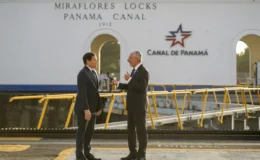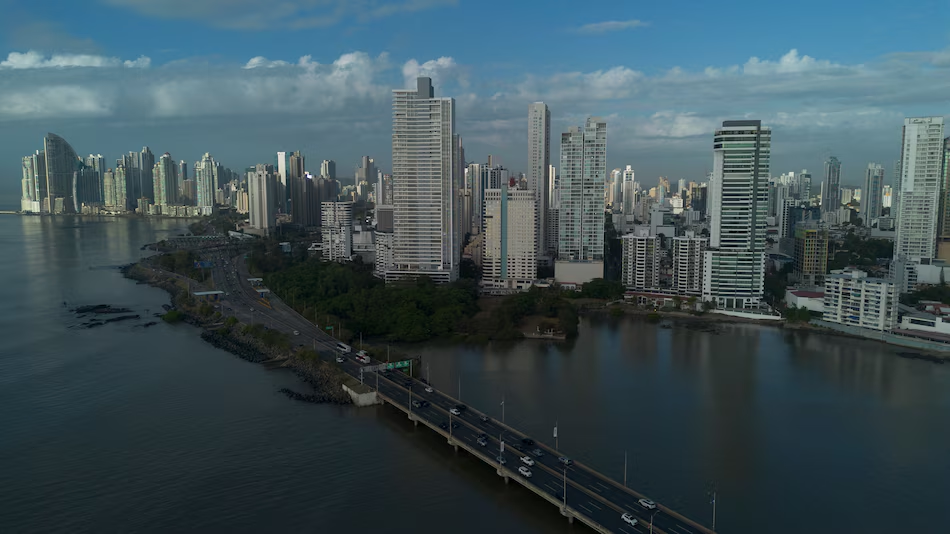ISN’T this NEWS??? PANAMA has problem with Electrical Authority oversight!!! #RFBpowermafia
- By : James Bryson
- Category : Economy, Energy/Infrastructure, Human Interest, Land Ownership, Political FRAUD

Not too quick on the uptake LA Estrella……….has been issue for YEARS. Check out BDT.
Former Energy Secretary Juan Manuel Urriola resigned from his position in July of this year. Now, he speaks exclusively with La Estrella de Panamá about the current state of the energy sector, the necessary changes in regulatory bodies, and a contract that could cost the state millions.
I think the time has come for the energy sector to have representation in the cabinet. Because right now, while it’s true that the Secretary of Energy holds the rank of minister, the truth is that he doesn’t participate in the cabinet, and that keeps him somewhat distant from a dynamic sector, which remains somewhat distant from its peers and the president. This could be the case, for example, in the Ministry of the Environment.
We must pay close attention to the Public Services Authority (ASEP). ASEP is an institution that guarantees sound decisions and must have the human resources, training, and capacity building to keep up to date because it’s in a very dynamic sector, and that’s not happening. We need to get it moving. Some have thought it should return to the days when there were three administrators—one in water, one in communications, and one in electricity—who made decisions collectively. You can’t be making decisions involving so many billions of dollars concentrated in the hands of a single person.
On the other hand, the electricity transmission company (Etesa) has long been run in a highly political manner. A young man arrived with great enthusiasm, but he was left alone to clean up the mess, and he has been left very alone.
There were many contracts that weren’t well-structured, there were agreements that were made verbally, there were suspended projects. So it has to be managed as a governance system.
Etesa is responsible for building a fourth line. Etesa is responsible for expanding the circuits coming from the Chiriquí side. Etesa is responsible for interconnecting with Colombia. It’s quite a responsibility. It seems to me that the Etesa manager has been left a bit alone, isolated. And he’s doing what he can, but more needs to be done.
Everything we do in Panama is known abroad. Investors know it, the people know it. Be careful, when we want to go out and buy energy or seek investment, other neighboring countries are doing the same things. And if we don’t guarantee efficiency, transparency, and compliance with the law, then we won’t be the ones chosen for these important investments.
That’s one project, among others, that the current administration inherited. It’s a project that was supposed to be carried out through a public-private partnership. In fact, the Ministry of the Environment considered that some modifications were needed; it didn’t reject them; it asked for them to be included, and the modifications or suggestions the ministry suggested are being made.
I hope all of this goes forward because I feel there’s interest. International and multilateral banks continue to have confidence in Panama, but sometimes they feel like we’re not keeping pace with other countries.
Line 4, apart from being necessary for the near future, is also important because it could give life to the Chan 2 hydroelectric plant. Chan 2 would be an ideal complement to the fourth line, which would be the last major hydroelectric plant of any capacity.
We started with Law 6. We had to put Law 6 on hold because the president requested that the Social Security law be passed first.
That gave us the opportunity to rethink this issue. Law 6 is the electricity law, the electricity law that regulates the entire market or shapes the guidelines for the entire open electricity market that we have. But there’s a problem. Many people, especially in the Assembly, want to tamper with the law and patch it up. And every representative believes that Law 6 is like an Olympic medal that I want to wear around my neck. That can’t be the case. To the extent that Law 6 is allowed to receive input from representatives who sometimes don’t know the subject or who are sometimes looking for locker rooms, things will be confusing. I would suggest creating a presidential committee that is neither ASEP nor the Ministry of Energy.
I’m a bishop, but a bishop who knows the chessboard of energy very well, very well. And since I know the chessboard of energy very well, I prefer to talk, just as I’m talking to you, about things that can and should be done to make this go better, and not focus the issue on Juan Urriola.
As the president said: ‘He’s already resigned, he’s already resigned.’
I prefer to invest my time in teaching. What do we need? How should we handle this issue, which is so widely discussed and which shouldn’t happen again, and which we had already said wouldn’t happen, but it did? The transfer of contracts that end up seriously affecting tariffs and the pockets of Panamanians. In a globalized world where we send very bad signals to investors, to the international market, to the people with whom we must be interconnected, it’s as if we invented contracts.
I’d say we need to strengthen our transmission system. We need to improve the quality of the distributor’s service. We also want investment to arrive. That investment would come with the contracts, with that schedule where we give the investment enough time to prepare. But when we’re at the height of this, a contract from 15 or 12 years ago appears, a contract that was never even considered, a piece of paper, a phantom contract, and the contract appears and is reinstated and transferred at prices from 15 years ago. It’s as if you were to say, come here, we’re going to transfer that contract to these companies, and it revives the prices from 12 years ago when current prices are half that.
This is a specific case that happened recently. This ultimately hits the pockets of those who have to pay for electricity. It turns out these imbalances are so large, so large that in this last case, I estimate the impact on end customers could be upwards of $375 million, with an annual impact that could be around $25 million.
No, they weren’t negotiated, they were taken. The thing is, that contract should never have been revived. That contract should have been allowed to die. Two governments came before this one, where those same gentlemen tried to impose that contract, and in reality, I believe that the day they actually review it, they’ll find that it doesn’t even have an environmental impact study.
The contract belonged to a company called, or is called, I don’t know if it still exists, Cool Power. That was the company that had the piece of paper that was selling it, and then there must have been other companies that bought it. ASEP should know that. It hasn’t said anything. It also hasn’t said what prices. It also hasn’t said what delivery times for those. ASEP needs to be more transparent with the market, and that’s why the time has come for ASEP to reengineer itself.
There must be some people there who have made bad decisions because it’s a level of impact of those hundreds of millions of dollars, we’re not talking about 10 cents.
Absolutely Etesa. The Etesa administrator and its director of electricity. In my opinion, those are the people who must have made the decision at the time, because I don’t know how it was done. I wasn’t there. I wasn’t even consulted, being the director of the electricity and energy department in this country. Such things must never happen to us again.
The truth is that when we arrived, ASEP was already making those same mistakes, and each time they do, they cost a lot of money. As had already happened, we said, “This government won’t do that anymore.” And we fell into the same trap we’d been criticizing.
Who is ultimately responsible? The Ministry of Energy or ASEP?
Above the Ministry of Energy is the Minister of the Presidency. There’s no one above ASEP anymore. ASEP is the last resort. From there, they jump to the Supreme Court. The Court should have better training and better facilities to handle energy cases more expeditiously. Because this isn’t a lawsuit against one another. This is a lawsuit that could affect 400 million people, and who knows how large the investment level will be.
The sharp fluctuations in rates and cash flow that have been occurring beyond what distributors are demanding are the responsibility of ASEP and different governments. So if this is happening under different governments, the problem lies within ASEP itself. Something is happening deep inside, deep within, in the confines of ASEP, and no matter who takes over, the same mistakes are being resurrected.
I think it’s primarily the distributors and ASEP. I think ASEP doesn’t have the structure to follow up.
When ASEP says I’m imposing so many millions of dollars in fines on the structure, half of that fine is ours because we’re partners, 50%. So we’re paying it. What should have been done is to ensure that this fine never occurred. And for this fine not to occur, the distributors must have respect for the institution. There must be a vigilant team anticipating problems so that these things don’t happen. Because later, why do we say we’re going to fine them? They get that fine, go to the Supreme Court, and it’s postponed for 10, 12, 13, 15 years, and there’s no money to cover it. We’re not being proactive. And that’s hurting us.
This is a sector that seems to only have problems when the power goes out. No, there are other problems, so that the power doesn’t go out, so that we have quality of service, so that we have the respect of those who participate in this market. Because it’s becoming a bad habit that I come in, win a bid, set the lowest prices, but have no intention of complying. We’re not being serious. And since we’re not being serious and formal, then they play the stock market with us.
What just happened has happened before. And if we don’t stand firm this time, it will continue to happen. And this market will deteriorate day by day because the laziness and lack of seriousness could prevail.
The region is the focal point right now. We visited the region. In fact, we brought solar energy to one of the places, Wargandí. Colombians are very advanced in social and environmental matters. The project is a beautiful one that should be monitored and we should be more aware of it. But we need to do more detailed work with the indigenous people.
I realized, now that I visited Wargandí, that no one goes there. People go there, I imagine, when they want to vote, if they can make it there at all.
I don’t think they’re taking advantage. I think this is their moment. If you come here and need something from me, then I have to ask you for something. A path, a road, a light, something. So you have to know how to reciprocate.
The project is a beautiful project, which has significance beyond Colombia and Panama; it’s a project of the Americas, it’s a project of the region, and it has great meaning for everyone.
If we have exit and entry through Central America and exit and entry through South America, we have the possibility that an investor might say, you know what, I prefer Panama.
What progress has been made on the ethanol issue?



No Comments